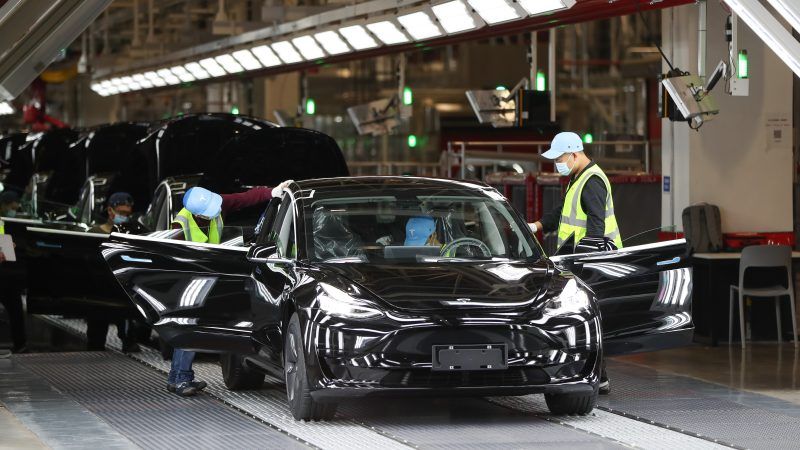The Trade War Drove American Automaking Jobs to China as Tariffs Stalled U.S. Exports
Further evidence that tariffs simply don't make sense as trade policy. President Joe Biden should take note.

Former President Donald Trump's trade war sank American manufacturing exports and inadvertently helped shift automaking jobs to China as carmakers, including BMW and Tesla, responded to new uncertainty in global supply chains by moving more manufacturing across the Pacific.
That's just one of the ways that Trump's trade war and "phase one" agreement with China, signed a year ago, seem to have backfired, according to a recent report published by the Peterson Institute of International Economics (PIIE), a trade policy think tank based in Washington, D.C. As President Joe Biden considers which of his predecessor's trade policies to roll back and which to maintain, the report suggests that Trump's tariffs have done significant damage to the very sectors of the economy they were supposed to help.
Chad Bown, a senior fellow at PIIE and the report's author, notes that China had become the second-largest export market for American-made cars by 2017, the last full year before Trump's trade war began. After a series of tit-for-tat tariff increases between the U.S. and China, however, American automotive exports to China fell by more than one-third. Higher tariffs on imported car parts from China raised costs for automakers in America, while China's retaliatory tariffs on American-made cars hiked prices and reduced demand in China.
To avoid those costs and to evade increased uncertainty, some carmakers began shifting their supply chains—but not in the direction the White House was hoping.
BMW, for example, shifted much of the production of its X3 sport-utility vehicle from Spartanburg, South Carolina, to China after reporting that tariffs had cut the company's American profits by about $338 million in 2018. The higher costs imposed by the trade war caused Tesla to announce that it was "accelerating construction" of a new plant in Shanghai.
Overall, the number of American automating jobs peaked in September 2018, shortly after Trump's trade war began, and then declined during 2019 and 2020.
The signing of the "phase one" trade deal with China did little to stop or reverse those shifts. Even though China pledged to increase its purchases of American-made vehicles and car parts as part of the agreement, exports are still lagging well behind their pre-trade war totals, according to the PIIE report.
"The U.S. auto sector provides an excellent illustration of how even temporary trade war tariffs can inflict long-term damage," Bown concludes.
It's also a good microcosm for understanding why Trump's trade war didn't achieve its stated goal of reducing America's trade deficit with China, and why the Biden administration would be wise to abolish those tariffs as soon as possible.
Trump believed that hiking tariffs would reduce America's imports from China, allowing the gap between the value of those imports and the value of America's exports to fall. What he failed to grasp, however, is that many of those imports—especially when it comes to manufactured goods—are materials necessary for making the items that American companies end up exporting back to China: like cars.
Higher costs imposed on imports ended up slowing American exports—and thus the trade deficit actually grew. Meanwhile, companies could avoid the cost of Trump's tariffs by shifting production out of the United States, and some chose to do that.
Biden, so far, seems unwilling to remove Trump's tariffs. By announcing a misguided "Buy American" policy for government procurement, Biden is also expanding on some of the Trump administration's protectionist manufacturing policies.
If the past few years are any indication, all Biden will likely accomplish by this is to further erode America's industrial base by trading away automaking jobs in exchange for the appearance of "toughness."
